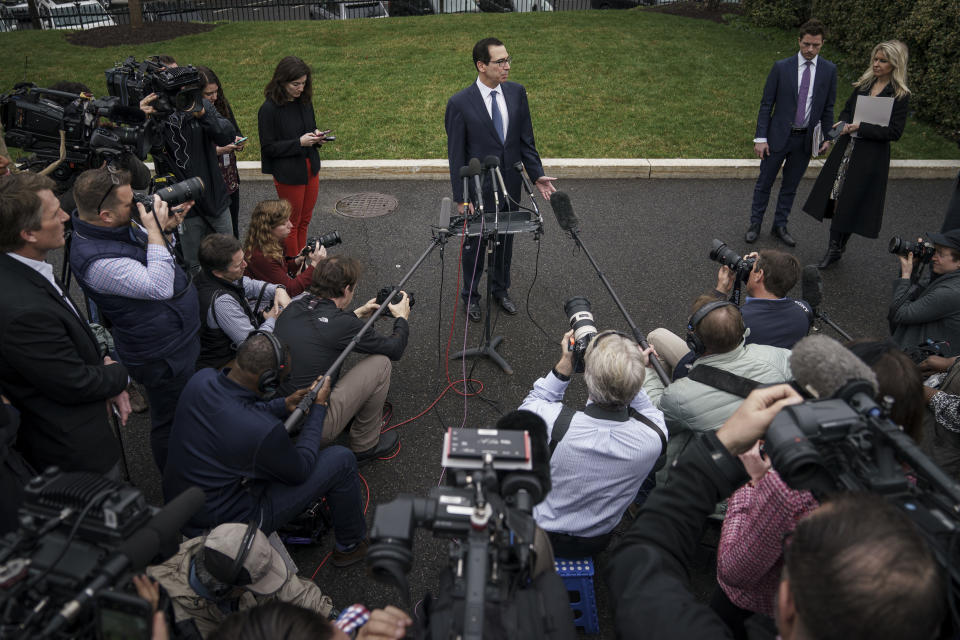'Americans need cash now': Washington debates how to spend $850B on coronavirus stimulus
On March 6, President Trump signed into law an $8.3 billion emergency spending bill to begin to deal with the coronavirus crisis.
On March 14, the House passed a phase 2 deal with a wider range of measures, including free testing for everyone. The Senate is currently considering that deal with the idea of sending it to President Trump soon.
The phase 3 deal, which is just beginning to come together, will likely dwarf everything that’s already been passed if Republicans and Democrats can agree on a bill.
There are some signs that they want to act quickly. "It's going to be big and it's going to be bold" said President Trump on Tuesday.
The Senate is aiming to move this week after they pass the phase 2 deal. “I don’t think we can assume that we can keep reconvening the Senate every week like we did this week,” Sen. Marco Rubio (R., FL) recently told Politico.

Treasury Secretary Steven Mnuchin was on Capitol Hill Tuesday to push the White House package that could cost somewhere around $850 billion. Senate Democratic Leader Chuck Schumer has been discussing a $750 billion package.
Right now, details remain sketchy but negotiators are working through a range of different ideas about how to spend all that money.
A push for direct cash infusions
The centerpiece of the deal is looking likely to include direct cash payments to U.S. citizens. “We want to make sure that Americans get money in their pockets quickly,” Mnuchin said on Tuesday.
“Americans need cash now and the president wants to get cash now, and I mean now in the next two weeks,” he said.
That idea, whose details are still to be announced, will likely find a receptive audience among Democrats.
Democrats have pushed for cash infusions directly to U.S. citizens. Jason Furman, chairman of the White House Council of Economic Advisers during the Obama administration has advocated the idea of a direct payment of $1,000 to every U.S. citizen or taxpaying U.S. resident. Republican Sen. Mitt Romney also recently proposed that “every American adult should immediately receive a one-time check for $1,000” as part of his coronavirus response plan.
As “helicopter money” advocates like to note, President George W. Bush signed a bill during the financial crisis of 2008 that cut checks of $600 to most individual taxpayers.
Details are still being worked out but Secretary Mnuchin suggested that there will be some limitations on who gets the payments. “I think it's clear, we don't need to send people who make over $1 million a year checks” he said on Tuesday.
The deal is also likely to include some sort of direct cash infusions to companies. The White House repeatedly promised for direct assistance to impacted industries.
“We're going to back the airlines 100%,” Trump said on Monday about one heavily impacted industry. On Tuesday, Reuters reported that the Trump administration proposal includes $50 billion for airlines.
More ideas from Capitol Hill
The Democratic proposal has been led this week by Democratic Senate leader Chuck Schumer, who is proposing $750 billion in spending.
“We are proposing an immediate and initial infusion of at least $750 billion to wage war against COVID-19 and the economic crisis it is now causing,” Schumer said on the Senate floor on Monday.
So far, he has only sketched out his ideas but they are focused on things like addressing treatment capacity issues in hospitals (with a Defense Department role in increase capacity), expanding unemployment insurance even further than was done in phase 2, and ensuring “that everyone can afford treatment for coronavirus.”
On Tuesday, Senate Majority leader Mitch McConnell laid out further ideas for the possible deal, including more assistance to small businesses and additional support for medical professionals. The Trump administration’s proposal reportedly includes $250 billion for small business loans.
The Senate is continuing urgent talks on additional legislation to address three major priorities:
1. More direct assistance for American workers & families.
2. Secure our economic foundation & our small businesses.
3. Further support for medical professionals. pic.twitter.com/SZYxnD1jml— Leader McConnell (@senatemajldr) March 17, 2020
A big question is whether this deal – or a phase 4 or later deal – includes provisions to cover the costs of medical treatment for people who are hospitalized with COVID-19.
Democratic presidential frontrunner Joe Biden, on Sunday, said he would make sure as president “that all their medical bills are cared for relating to this.”
Trump, during his address to the nation last week, said insurance companies “have agreed to waive all copayments for coronavirus treatments,” but the reaction from the insurance companies quickly forced the White House to backtrack and clarify that they were only looking to cover the cost of testing and expand coverage for treatment.
What might be off the table: a payroll tax cut
The idea of a temporary lifting of payroll taxes has been at the center of the White House’s plan for the response in recent weeks. “Only that will make a big difference!” Trump recently tweeted.
The price tag of such an idea would likely be huge. One estimate for the cost of a complete suspension of payroll taxes for the remainder of the year is $807 billion.
But on Tuesday, administration officials appeared to back away from the idea amid consistent Democratic opposition.
UPDATE: This story has been updated with additional comments from the White House and lawmakers on Tuesday.
Ben Werschkul is a producer for Yahoo Finance in Washington, DC.
Read more:
Senate weighs emergency spending amid outbreak; administration urges more
What’s in Washington’s economic stimulus deal
Trump declares national coronavirus emergency as worldwide deaths top 5000
Read the latest financial and business news from Yahoo Finance
Follow Yahoo Finance on Twitter, Facebook, Instagram, Flipboard, LinkedIn, YouTube, and reddit.
